Podcast: Download (Duration: 44:38 — 41.0MB)
Get Notified Of Future Episodes Apple Podcasts | Spotify | Amazon Music | Android | Blubrry | Gaana | TuneIn | Deezer | Anghami | RSS | More
Podcast highlights:
00:37 – Back in the rotation
01:46 – A question of frequency
02:26 – 60 Minutes versus Netflix
05:52 – Timeliness and production value
08:26 – Dean’s current podcast flow
13:20 – The More Cheese Less Whiskers story
16:13 – A misconception about podcasting
17:43 – What happens after recording
21:30 – Super signatures and content upgrades
23:18 – A greed-inducing opportunity
26:47 – How much free info is too much?
30:35 – The Zuck Slap
32:25 – Getting around Google
37:16 – The MOO method
40:01 – Tipping the content floodgates
Get private one-on-one business coaching from James when you join JamesSchramko membership
Part 3 of the series
Part 5 of the series
Transcription:
Dean: Mr. Schramko.
James: Mr. Jackson, how are you?
Dean: I’m fantastic. It’s so good to hear from you.
James: It’s great to hear from you. It’s been such a long time since we spoke yesterday. [Laughs]
Dean: [Laughs] We’re back in the rotation.
James: We are back in the rotation, and with that I should do an official introduction.
This is James Schramko here. Welcome to SuperFastBusiness.com. You’re listening to part four of a 25-part series called Life Behind the Scenes with Dean Jackson and James Schramko. This is episode 569.
Dean, it’s been around about 71 episodes since we last caught up and it was about 74 episodes before that for part two, and then way back, like a 115 or so before that. So it seems like we catch up every 70 episodes.
Dean: Why, you’ve been very busy.
James: I have been busy, but I will say this, it’s about all I do.
Dean: Yeah.
James: Put out an episode each week.
Dean: Well, that’s awesome! And that’s just one a week?
James: One to two a week.
Dean: I was going to say, you have to do one to two.
What’s a good content frequency?
James: The first topic I think we might cover is this idea of frequency and in being a metronome in the market, because with my podcast I tend to work with the energy level that I’m feeling. So there’s times when I’m at home, or I have good internet, where I want to just create stuff and I feel like I’ve got something to say and I have the energy and I have the infrastructure.
And then there’s other times, especially when I’m traveling, say around Europe to eight different countries, it may not be as ideal for me to be scheduling podcast or I might feel like I want to just immerse myself in the experience and I don’t feel like recording something just because of the schedule.
And for that reason my podcast is a little more like Netflix, where you might go for a while without something and then you might have a bunch of releases. And some of my thoughts on this are driven by the research that I’ve seen from Netflix themselves, where they show a huge proportion of people will binge-watch an entire series in just a few sittings. Any thoughts?
A 60 Minutes approach
Dean: Yes. And I agree. I think that podcasting, it’s just such a flexible medium, you know? And I have adopted a, I call it like a 60 minutes approach. You guys have 60 Minutes Australia, same show, for just 50 years now. This is their fiftieth anniversary. And so the news – I’m assuming you know what show I’m talking about, right?
James: Of course.
Dean: 60 Minutes is just as popular in Australia? Of course.
James: Except in Australia, when they do that clock ticking like that, tick, tick, tick, tick, tick, we all think of Skippy the kangaroo because that was Skippy’s sound that he would do on a TV series.
Dean: Oh, exactly. That’s funny!
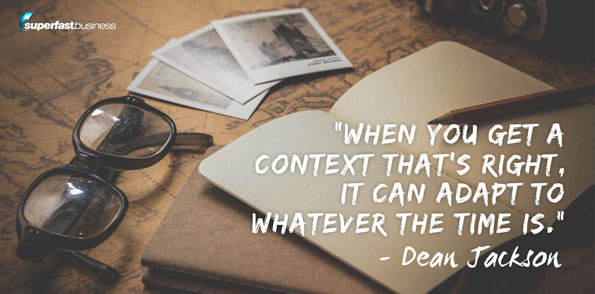 So I think about the consistency of 50 years in a row of Sunday night at 7:00 p.m. with the same three most fascinating topics that are in the zeitgeist right now. And that to me, that level of consistency is something that I really admire. I really love that and it shows just when you get a context that’s right, that it can adapt to whatever the time is.
So I think about the consistency of 50 years in a row of Sunday night at 7:00 p.m. with the same three most fascinating topics that are in the zeitgeist right now. And that to me, that level of consistency is something that I really admire. I really love that and it shows just when you get a context that’s right, that it can adapt to whatever the time is.
Their thing was that Sunday evening, that time of the transition from the weekend to the work week, that everybody is winding down from all the activity over the weekend. They’re starting to now kind of gear up and move towards thinking about the week ahead. And in that transition, there’s that consistent home of a format that has been unchanged for 50 years. Three 15-minute stories that are fascinating. I love that. And when you find a context that works like that, I think it’s very easy to kind of hinge one of your content strategies around it.
James: Definitely.
Dean: That’s kind of a fascinating thing.
James: I think that speaks volumes in terms of fresh is best. As you said, it’s whatever’s relevant at that time. So the format idea is a harness or a vehicle to capture whatever’s current right now. So it’s clever in that way. It’s not prepackaged way too far in advance perhaps, is one aspect of it. And that’s not so true of things like Netflix series, where they might spend a while filming it and then they release it all at once. So there’s that contrast.
Dean: I love that.
The production value – timeliness balance
I love that format too, that if you can have things that have an arc to a season type of thing where they’re progressing, where you’re advancing something. I think that what really opened up a new format for podcasting was when Serial came out. It was the first, fully-released kind of season that you could binge on as a podcast. And that’s kind of opened up the door for some of these other podcasts, like StartUp and K-Town was another popular one, that are sort of episodic kind of series that you can put a whole season out on one. But there’s high production on a lot of these too, you know?
James: Yeah. Definitely there’s this balance between production values and timeliness. Because on the far end of the other extreme you have things like Instagram Live or Facebook Live where you are streaming in real time, so it’s absolutely current information. Their production values are often quite low.
Dean: Right.
James: And one of the interesting things that I’ve noticed, I’ve got a client who has 10,000 students in his membership and he has a prominent YouTube channel with around 250,000 subscribers. And what he did was he moved from the more produced style of videos to more handheld selfie-style, I guess you’d call it ghetto style, but he actually just uses a Canon G7X camera.
Dean: That’s kind of that YouTube vlogger camera.
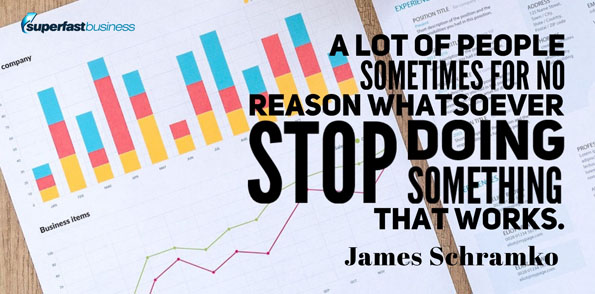 James: Yeah. With not even an external microphone and no fancy lighting. And he’s often carrying it around himself, and he has still got some guys that help him. But he went from the full DSLR, audio inputs and lighting to just this G7X and his views shot up dramatically. It somehow connected more with the audience. So it’s a constant topic that comes up is frequency and production values, and the format. But as you said, the most successful show on TV in America has a format that works. It’s a good thing to stick with it because a lot of people sometimes for no reason whatsoever stop doing something that works.
James: Yeah. With not even an external microphone and no fancy lighting. And he’s often carrying it around himself, and he has still got some guys that help him. But he went from the full DSLR, audio inputs and lighting to just this G7X and his views shot up dramatically. It somehow connected more with the audience. So it’s a constant topic that comes up is frequency and production values, and the format. But as you said, the most successful show on TV in America has a format that works. It’s a good thing to stick with it because a lot of people sometimes for no reason whatsoever stop doing something that works.
Dean’s current format
Dean: I agree. I was looking forward to sharing this with you when we’re going to get together in August. But since we weren’t able to get together in Manly this year, it’s January now so I’ve had an entire full year of this format that I’ve been experimenting with, and I am in love with it. I mean, it’s so great.
So I’ll explain it to you because you may know, I started about 18 months ago. I started a podcast called More Cheese Less Whiskers. And it is a format that is the easiest thing for me to execute, which is one business each week for a full hour, just hatching evil schemes for their business. We do a one-hour consultation. The whole focus is on applying the eight profit activators to their business.
And so I have zero preparation for it in that I’m not wondering what am I going to talk about this week, because I show up and the entrepreneur that’s with me is what drives what the content is going to be. So we have a fixed context of a fixed framework of my before, during and after unit with the eight profit activators and how they apply universally to any business.
So we get on the phone, it’s recording the moment we both connect on the conference line that I use, and we record the entire thing. I hang up the phone and then I immediately, while I still have my headset on, I immediately push the record button on my Memo, my Voice Memo on my iPhone, and I do the intro. No theme song, no anything, it’s just completely, “Hey everybody, it’s Dean Jackson. Welcome to the More Cheese Less Whiskers podcast, and this week we’re talking with…” whatever. And I do a little bit of an intro while it’s all fresh. I talk about what we’re going to talk about and then I push stop on that. And then I push the record button again and I say, “Wow, that was a great episode and here’s some of my takeaways on that one.”
And then I always leave my audio super signature, which leads people to the next steps for what they can do to keep the conversation going. And I then just forward those to my team and that is my entire involvement in the podcast process. Everything is all done in the one hour that I’ve set aside to do it. No homework, no processing that I’m involved in afterwards. All just completely I dial the phone, I talk and I’m done.
And then that sets into motion all of these other things that create quite an amazing set of digital assets that we work from, you know?
“No homework or hangover required.”
James: Yes, I like the no homework approach. That’s exactly how my weekly mastermind calls work, or my business coaching calls with the group, is I turn up at the appointed time, and then I work with whatever they bring to the table. And I like that because we have a framework that we use each week, that extracts the things we need. And when we hang up, there’s no homework or hangover required.
Dean: Right, that’s it!
James: But for some of my other podcasts where we had to prepare case studies and the customer wasn’t there, it did become work and it was an obstacle to getting the recording done. And then in the other case, I was lucky my cohost did the preparation, but then he stopped doing that. So we stopped that podcast.
But this podcast, you know, where we’re up to episode 569, it’s either been me talking or I talk to someone like you, which we’re doing now. And there’s no prep work for this, and there’s no homework afterwards because we both have some concepts that we want to talk about. And just like you, as soon as we hang up, the team takes over and does absolutely every other part of the process. And the only optional part would be me letting you know the podcast was out. Because we don’t have template that, I don’t like that being templated. Because I receive those, and they just seem very bland and insincere. I would personally send you a message on Facebook. I’ll say, “Hey Dean, that podcast is out now.”
Dean: That will make me feel nice, yeah.
A domain just for Dean
James: And then there’s the other aspect too, which is, I found by by blending the different formats, like the individual shows versus the interview shows. I am driven by what is current at the time. But I think when you have a set format like you have for More Cheese Less Whiskers, which is by the way, it’s a domain that I always have a soft spot for since I bought it for you and gave it to you.
Dean: I appreciate that, yeah.
James: After hearing you say it.
Dean: I appreciate it. Look what I’ve made of it.
James: You’ve done spectacular! I mean, I got the idea from you in the first place, but that was back in my opportunistic days where if I hear something catchy, I’ll register it and save it for the person. Because I used to often find that other people would go and grab the domains and you can’t get them back. So I wanted to protect you.
Dean: Speaking of which, I’ll share something.
James: I’ll just finish that thought.
Dean: OK, go ahead.
James: Yeah the case study format, when you dial it in like that I truly think you have a 60 Minutes on your hands. And based on the groundswell that’s been created from your podcast, More Cheese Less Whiskers, it’s definitely that medium has been strong for you. And your other one, I Love Marketing has been a strong podcast and I know from when I appeared on that.
Dean: Three hundred, over 300 episodes on that one.
James: It’s not just the number of episodes. I think it’s the quality of listener. And the reach you have might be wide, but I think it’s way deeper than some of the people who have thousands of podcast episodes.
Dean: Yes, that may be true. Yeah, I think you’re right because we came out strong and early, I mean relatively early, in that era. I had been doing a podcast since 2005, whenever podcasting first started. I had a podcast called Marketing Monday, and I did 200 episodes of that, where it was literally just me doing a podcast by myself every week.
And interesting enough, I would tie my recording time, I would anchor it to 60 Minutes. Which is kind of funny, but I would watch 60 Minutes and during 60 Minutes I was kind of crockpotting what I was going to talk about on the podcast. And when the show wrapped up, I would go and immediately record my Marketing Monday podcast.
So even the consistency I owe to 60 Minutes is kind of funny. Because I always watched 60 Minutes so I would kind of anchor to that as my production of the podcast.
James: Yeah, it’s using an activator to catalyze that action.
Dean: Yeah.
James: Like a recurring reminder.
The podcast misconception
Dean: Yeah. But when Joe Polish and I started I Love Marketing in 2011 (really the transition from 2010 to 2011), there weren’t as many podcasts as there are now, certainly. This last five, six years has been a straight line growth for podcasts. And I think that sometimes people get disappointed in that, they think that if you build it, they will come, is the way that podcasting works.
James: Sometimes. It’s pretty common.
Dean: Yeah. I mean, they think, just get a podcast and put it up there on iTunes and I’m off to the races, you know? It’s like some, get in the chat stream there, and it’s not that easy.
“A podcast is really the cornerstone of the lead conversion process.”
I’ve always said that a podcast is really, I look at it as the cornerstone of my lead conversion process, more than a lead generation process. And you’ve got to separate the lead generation from that. I just kind of shared that with you, but that’s the reality.
I look at it just as a cornerstone of your lead conversion process. What I would call profit activator number 3 – educate and motivate. There’s no better way to create a flagship, you know? Because you get so many opportunities around it.
After the recording
Like I mentioned that I do the recording and then I’m done. But from there, we get the transcript done and that goes to a writer who then goes through the transcript and finds 300 to 500-word articles, right? Gold nuggets kind of thing within them. And that drives me sending three emails a week that are pure content to all of my subscribers.
And so three times a week, and I’ve maintained this regimented calendar of it, that the new podcast episode comes out on Sunday and we email on Sunday, Tuesday, Thursday, for sure. Three times a week.
And each one of those emails contains a P.S. that I get to mention something timely and topical, like I’ve got a mastermind coming up next month or whatever is the topical thing, or I’m starting a new email mastery case study group.
And then I add my super signature, where every email ends with, I can help you hatch some evil schemes for your business and I get to present for people this perpetual loop. So I could say, first off, “You can be a guest on More Cheese Less Whiskers,” so that keeps me with this never-ending flow of people who want to be a guest on the podcast. And Lilian, my assistant, gets to go through and check out the people who are going to be on the show and set them up into the time slots that I’ve set aside to record the podcast.
James: Perfect. So with your little piece of content, how does someone get onto your newsletter in the first place?
Dean: Well, all roads lead to getting on that list. On two sides, we have the real estate side and the entrepreneur side. So everything at deanjackson.com that they could be coming on from there, or we’re constantly running Facebook ads for emailmastery.com or for 90minutebook.com. All of the opt-ins kind of lead into this same area so that it’s a unified kind of follow-up.
James: So if they go from More Cheese Less Whiskers or I Love Marketing, do they still end up there?
Dean: Yes.
James: So what we’re really talking about is unsegmented marketing.
Dean: That’s right but it is segmented too. If somebody comes in through 90minutebook.com, they go through the welcoming process in acknowledging that that’s what they’ve opted in for. But the ongoing follow-up or same thing with emailmastery.com or deanjackson.com, wherever it is, we welcome people and go through the engagement process to find the people who need and want help right now. And then if we don’t engage initially, then the ongoing follow-up is all unified so that it’s all driven by the More Cheese Less Whiskers podcast, which is the flagship weekly follow up, the weekly podcast.
Super signatures and content upgrades
James: And you’ve had success putting your super signature at the bottom of that, piping people to whatever they need to get from there, right?
Dean: Yes, of course. And so the offers on that super signature are really the things that drive where people want to go in the next step.
James: So for people who listen to the podcast that find it, they may be listening to this podcast and they go over to iTunes and they start listening to More Cheese Less Whiskers, do you ever give them things they can opt in for, like content upgrades, I believe people call it? In our case, one of the big innovations – and I love how you take your three pieces of content and put them into emails, it’s very clever – in our case, we broadcast every episode once the transcription is done and the bullets are done. And we usually create a high-value something to give away from the episode and that’s why we started numbering the episodes, so that people could find them easily on the website. And we’ll give away a cheat sheet or a workbook or tips or a checklist, so in effect each podcast is a pre-sales page for the SuperFastBusiness membership waiting list.
Dean: Yes. I love it. As you know, each podcast with me ends with the audio super signature. It’s the same kind of thing, right? If you’d like to continue the conversation, you can go to morecheeselesswhiskers.com. You can download a copy of the More Cheese Less Whiskers book. If you like to be a guest, you can click on the Be a Guest link and we can hatch some evil schemes for your business.
A big, big piece of cheese
James: I imagine the Be A Guest opportunity immediately triggers the selfish greed gland on a prospect and it overrides all fact that they’re opting in to receive news and they’ve started thinking about themselves, which is just a huge piece of cheese.
Dean: And that’s exactly what I meant it to be, you know? I meant it to be that and I’m not holding anything back. I’m not pitching anything to people on these calls. I mean, they’re legitimately getting what would be a $2,500 consultation if they were paying for it, you know?
I’m like, giving them the best advice that I can give them in that one hour for whatever is the need that they have right now. And we’ve had some amazing outcomes from that. We’ve had some people who’ve really taken the conversations. It created some incredible outcomes.
James: Leads me to wonder, how many people would you have banked up waiting to talk to and secondly, what is your thought on how much you can give away? Like do you have a lot of people listening to episode after episode after episode, and do you mind if only a small percentage of your listeners come to your workshop or buy a product from you? Is that okay?
Dean: Well, I think that what I have found is that it has driven more people to workshops and more people to my Email Mastery program. Because people have an insatiable desire to have something directly applied to them. You know, even if it’s close, even if the advice in theory is the same, to hear it said exactly about your situation is different.
Case in point, just a couple of weeks ago I had somebody who had joined our Email Mastery program. And in Email Mastery I do two live calls where we’ll just brainstorm emails and mastermind wordsmith them. And yeah, we had a lady on who had sent an email based on hearing me talk about it to someone else and had gotten really great results. But then when she came on and we talked about it and I pointed out something specifically for her situation, that was immediately relevant and she got it on a different level. She said that same thing, “I heard you say it, but it wasn’t until I heard you say it specifically about my situation, using my words that I had written, that I really understood the value.” It was really something.
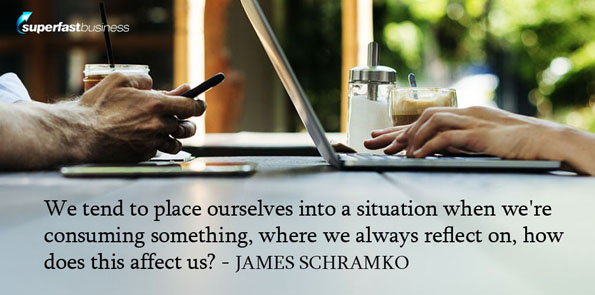 James: That is interesting, because I know we tend to place ourselves into a situation when we’re consuming something, where we always reflect on, how does this affect us? It’s like our automatic gravitation. What’s in this for me? How does this apply to me?
James: That is interesting, because I know we tend to place ourselves into a situation when we’re consuming something, where we always reflect on, how does this affect us? It’s like our automatic gravitation. What’s in this for me? How does this apply to me?
I imagine some people are very good at listening to your podcast and applying their lessons to their own business, and I’ve actually had an extreme example of this where I got an audio from someone who read my book, apologizing because he’s never purchased anything from me, but he’s applied everything he’s learnt from me over the years to completely transform his life. And I invited him to come on my podcast and share this.
How much free info is too much?
And he came along and shared his story, and it turns out he did actually come to one of my mastermind events at my house as a guest of his business partner. But that aside, some people are very able to take the story and then other people will pay a premium for that customization. But it’s a question I get asked a lot, is can you put too much free information out there in the marketplace?
“Can you put too much free information out there?”
Dean: I don’t believe you can.
James: I don’t either. I don’t think so.
Dean: For me, I think it’s just more demonstrating, you know? It’s funny, the thing that people often say about More Cheese Less Whiskers is that they listen in and they think, well how is he going to pull this off? Like, what is he going to tell these guys? And then, they just get completely like, I never thought of it like that. It’s good to reinforce.
As I like to say, especially if you have your own framework, where you’ve got something that you are anchored to in your philosophy or methodology or a framework for what it is that you’re teaching, you have to sort of revere your expertise as the world’s leading expert in that methodology. That’s the absolute truth is there is nobody in the world who knows more about applying the eight profit activators to a business than me, because I’ve been working on this for 30 years.
An element of improv
James: You would find it very rare that you would be unable to answer a question and you would find it very common that someone listening would go, ‘Gosh, how’s he going to answer this?’ So you create that drama and tension and compelling reasoning. That’s very clever.
Dean: Yes. It’s an element of improv theater, in a way, too. Because you don’t know. It’s being created on the fly. It’s not scripted. 90 percent of the time it’s the first time I’ve ever had any interaction with that person.
And there is that thing of flying without a net, as John Carlton would say. That you’re doing it without an agenda. But it’s always fascinating. That’s what makes it real, it’s that it is 100 percent real, and just giving.
James: You could always lose the recording, I suppose, if you couldn’t fix someone’s problem. But I doubt it’s ever happened to you.
Dean. No, no. Yeah, you post them all up.
James: Speaking of John Carlton, he was my first podcast episode, number one, in 2009.
Dean: Wow!
James: It’s amazing how that time creeps by and here we are. I must be in my ninth year or coming into it for podcasting. So people look at my business now, but they don’t realize it’s been an organic growth over just constant, literally, hundreds of episodes stacked together in a leveraged way that people can consume over and over again or find. You know, people will find this episode in a year or two from now and listen to it. And then they’ll typically go back and listen to the first three episodes of a four-part series, which is why I started doing series, because I figured out that people like to collect. And if they get into one, they’re likely to mine out the others, like you might with Black Mirror on Netflix or something similar to that.
Dean: Right.
James: You don’t just watch one.
Dean: Yup. Or Comedians in Cars Getting Coffee.
James: Now, you opened up a loop before and I never came back to close it. It was you were going to share, I think, an interesting story around the domain name or something to that effect. We were talking about More Cheese Less Whiskers, and a funny story, and then we moved on to another topic. I just think it’s fair to come back to that.
Dean: Thank you.
The Zuck Slap
So you know it just happens to be very timely, because just like you paid attention and you bought More Cheese Less Whiskers in case I ever would want it. Remember when the Google slap happened and it became affectionately known as the Google slap, and everybody who was doing SEO or AdSense or even AdWords was adversely affected by that? You know, it had big impact on people who’d built their whole business around that they’d found a loophole in Google.
And everybody started then moving over to Facebook, and it became that Facebook was kind of the new land of opportunity. And I just had the foresight to think that at some point something is going to happen. And I coined the phrase and bought the domain name ZuckSlap for Mark Zuckerberg. So just recently, just in the last week, you know, Facebook has announced big changes over at Facebook for their news feed algorithm that are going to penalize or restrict access for business content, which is just, you know, the equivalent of a Zuck Slap.
So I had registered zuckslap.com several years ago in anticipation of this moment, and now I need to figure out what to do with that website. But I just happen to have it.
James: Oh, that’s funny! As chance would have it, when the Google slap came, I had an SEO business and I watched most of my competition get wiped off the face of the earth. And one thing in particular helped us tremendously, and this is important for anyone to take on board.
Beating the Google slap
Actually, I’ll share three things. But one is, we had a research and development team. So I had people in my business, we had a team of 38 people in that division in the SEO division. We were doing over a million dollars a year in revenue, and I was actually pioneering things at your I Love marketing event. I even asked you a specific question, and you gave me a fantastic answer about the free report, or the $20 audit, whatever, when we were talking about what would be the dream scenario for a client. And I was asking about how we support that.
Anyway, we had a research and development team and their whole job was to find ways that our rankings could be achieved using methods that weren’t currently known and assuming that the methods that we were currently doing would no longer work.
Dean: It’s so good.
James: The interesting shifts that happen for us is we went from a thousand-blog network that we owned. I had 2000 domains and we’d developed over 1000 of them, we were able to go from that to using a social media portfolios that didn’t rely on my own domain names. So it did a few things. It anticipated the change to social media, it created way less risk for our business and in turn our customers, and I was then able to sell off my domains and blogs, which I still sell to this day. I still make a sale every week or two, a $2000 or $3000 domain sell that’s just listed up there in the marketplace.
So it freed up my assets to sell. I ended up selling the whole SEO business to my very best customer, who was buying half the supply, more than half the supply by the end, and moved out of the business completely. But it was just fascinating to watch everyone drop like flies because they were only working to the level that they currently knew. And I’m seeing something very similar now with cryptocurrency. It just seems very hot and it just has to have a slap at some point, so I don’t know if you’ve registered CryptoSlap yet. If you figure out how to monetize ZuckSlap.
Dean: It’s being slapped today as we speak, actually.
James: Is it? Well, I’m not surprised.
Dean: Taken a bit of a hit today. Who knows? A long game on that.
James: The other two points that sort of come up around that are my philosophy of Own the Racecourse, where you build an asset that you could sell and like, not be single-source dependent on any one traffic source or business unit. So when Facebook gets slapped or AdWords get slapped or crypto gets slapped, there will be people crying about it. When they’ve got everything just dependent on this one thing and it gets taken away, they usually blame that thing rather than themselves for poor strategy.
Dean: And nothing lasts forever. I remember the days when you could get on the first page by keyword loading white text on a white background five pages below the fold and submitting that, and that would work as getting rankings. And there was a time when AdWords, you could set it and forget it, you know? You could load up all your keywords, set your bids and then just have traffic non-stop. For years, that worked. But things evolve and so we’re always in evolution. Things just keep getting better and better.
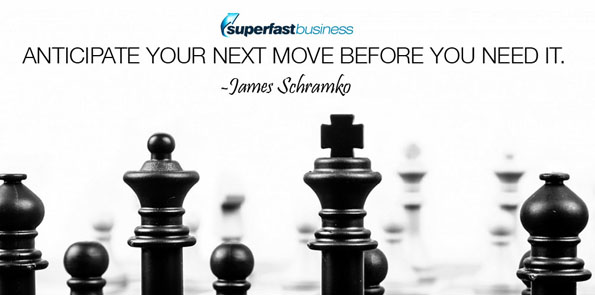 James: So the big takeaway is to anticipate your next move before you need it. Get the next job before you quit the first one. Build your next business to take over the first one before you start hating it.
James: So the big takeaway is to anticipate your next move before you need it. Get the next job before you quit the first one. Build your next business to take over the first one before you start hating it.
Dean: Yeah.
James: You’ll end up in a better situation. And I think it’s really interesting here that Facebook are just asking people to give them really valuable, engaging, rich media that they can give people a better experience.
But really what we’re seeing is, this answers the question, can you have too much free stuff? Facebook is giving people this massive free service, and then they’re telling them how they want it curated and they’re going to sell ads off the back of this.
Dean: Yes.
James: People are the customer and I don’t think some people realize that, especially from the comments on some of the paid ads that you see. We’re like, why is this rubbish in my feed? Well it’s because that’s how they make their money. That’s how they support you with this free service.
Dean: Even the news feed ratio has gone from one in seven posts being sponsored to one in five posts being sponsored right now. So 20 percent density of sponsored posts to organic on my mobile.
James: It’s a lot like the homepage of Google. Google search results are going to have quite a lot of ads these days.
Dean: Yes.
James: Crowding out that home page. So there you go. Very interesting discussion. Anything else you think is extremely different than the last time we spoke?
Multiplied Oral Output
Dean: I think I was just going to say I think that I want to just kind of put a bow on what I’ve lovingly started calling the MOO method, now which the MOO is for Multiplied Oral Output, that when I look at it, the easiest, fastest, highest-bandwidth way to get your thoughts into digital format is through your mouth.
And when you’re talking and then you record that, immediately you’ve taken something from inaccessible and analog – if you’re just talking to somebody, you’re only sharing with one person in real-time, that’s not leverageable at all. If you capture it, as you record it, it becomes digitized. And once you digitize it, it becomes an asset that you can create derivatives. You can multiply. You can do all kinds of things with it that don’t require you, you know?
And that’s really what I just want to make sure that I emphasize, that all I do on that podcast is talk, because I’ve set up the system that perpetually keeps guests showing up at the times that I block off, without me having to organize them or coordinate them. I just show up at the time and talk and then the emails get written and sent without my intervention. I get to see them before they go out, but it’s really very, very rare that I have to change anything on them.
I’ve developed a wonderful relationship with three different writers that I work with now, that take my oral output and create all this cool stuff from it. And so that, all that mechanism, I’m truly adopting this whole avoiding being the self-milking cow lifestyle, right? I’m allowing myself to just be the cow and not have to be the farmer as well. Not trying to milk myself and pasteurize it and package it up and take it to market and all of that stuff.
I just realized that the milk of this, of my creativity is just recording the audio, you know? Everything else can be done by other people.
James: Yeah, it’s a wonderful system. We’re on the exact same page with that. It’s how OTR works for our podcast.
Unstopping the bottleneck
One of the big innovations for us, and it probably happened maybe four or five years ago, was I noticed that I became the bottleneck at some point where they would draft up the email and send it to me for approval. So I instead created a conveyor belt in Slack. It’s called for approval, surprisingly enough. But they basically post anything there, whether it’s a review, an email, a blog post or a website page. They’ll just post it there and it gets like a few hours or half a day for changes before it gets published. But if I don’t interact with it or nothing happens, they just publish. They hit the button. So it’s like a delay on a radio station to try and catch swear words.
Now if they still publish it, if I’m on a plane from America to Sydney, and they publish something and I want to change it, I still just go into that for-approval and I just make the change that I want. I might just cut and paste one line, “Change this to this,” or “Remove this,” and they will just go and edit it. Because there’s very few things aside from a broadcast email that can’t be just amended afterwards, especially if it’s just published on your website.
So they will put the draft of the cheat sheet or checklist or template there, and if I do nothing, it gets published. That changed it in much the same way as a subscription program. It changed it from requiring my action to make it go forward to requiring my attention to stop it. And that was like tipping the floodgates, so the machine rolls on with or without me these days.
Dean: That’s so great. I’m super excited about that.
James: If I don’t want to go into the milking station and produce my creative milk, as you would put (this is Dean’s metaphor), then I would say, “Look, why don’t we do a Top 10 review of last year’s posts?” or “Can you grab a recording from our events and publish that?” So we just say, “Look, grab some milk from the freezer.”
“Grab some milk from the freezer.”
Dean: Right, right. So I love it that I have fortunately kept, because we have an abundance of people who want to be on. I got a little bit ahead of that. So I have not missed. I mean, I haven’t missed in 18 months one new episode every single week.
James: That’s nice.
Dean: It’s been great. But I love doing them. I really do, you know? And it’s not, I don’t record so I’m a little bit ahead. I don’t get too far ahead, I don’t stockpile them. But I’m ahead enough that I create a really nice two Fridays a month where I will do two podcasts. I’ll do one at 10 o’clock, I’ll do one at noon and then we’ll go to the movies in the afternoon. That’s my Friday, right? Which is really manageable because I get to wake up, still have a leisurely morning and then have two really great conversations about my favorite theme, marketing, and and then go to the movies and have the rest of the day. It doesn’t feel like a work day at all.
James: And there’s zero guilt either, you know? You’re not sitting there in the cinema thinking, ‘Gosh, who’s paying for all this?’ Because you’re OK.
I’ve done my stuff.
Dean: Oh right, yeah, yeah. I did my stuff.
James: I’ve put in my effort.
That was a great conversation. Thank you so much.
Dean: I love these, so this time we’ll have our episode five of 25. We will record live in Manly and we’ll be in its rightful spot in August.
James: Yeah. It’ll be in the correct part of the calendar.
Dean: That’s right.
James: Thanks for doing the catch up. And hopefully have a smooth journey across the short little travel, and we’ll spend a week talking about interesting things and see what’s new and different at that point. So what a pleasure.
Dean: Absolutely.
James: That was Part 4 of 25, Life Behind the Scenes with Dean Nine-Word Email, MOO Method, 60 Minute Jackson and James Schramko.
If you enjoyed this show, please share it with someone who you think would get something from it and we’ll see you on the next episode.
Join our community of like-minded entrepreneurs and watch your business take off
Liked the show? Get all the episode when you subscribe on iTunes
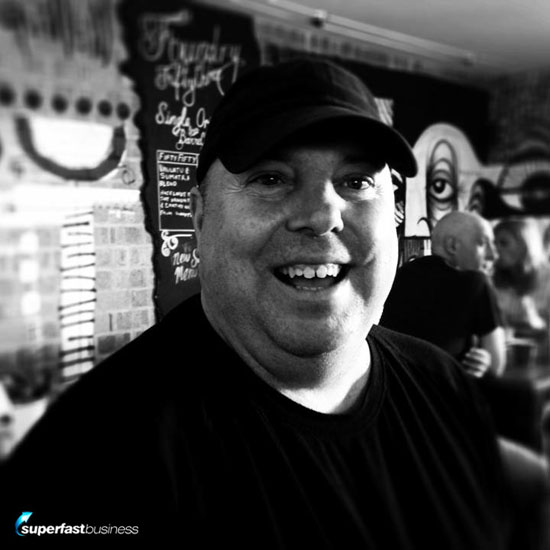
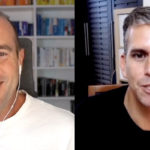


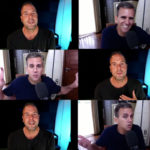





Thank you for this great episode Dean and James. You motivated me to get into the Youtube Dashboard of our Business to create backlinks to our website and social profiles! I recovered lot’s of lost link juice there… As well I figured out that the conversion rates from Youtube traffic coming to our Website is the highest of all the social traffic sources. James who would you recommend as the goto Youtube guy? Our biz lives of video-trainings and Youtube should be our main focus for lead generation. Thank you for all the great advice you share!
Thank you for this great episode Dean and James. You motivated me to get into the Youtube Dashboard of our Business to create backlinks to our website and social profiles! I recovered lot’s of lost link juice there… As well I figured out that the conversion rates from Youtube traffic coming to our Website is the highest of all the social traffic sources. James who would you recommend as the goto Youtube guy? Our biz lives of video-trainings and Youtube should be our main focus for lead generation. Thank you for all the great advice you share!
My favourite YouTube GoTos are:
paid – Tom Breeze
https://www.jamesschramko.com/?s=Tom+breeze.
And free – Brian Johnson
https://www.jamesschramko.com/?s=Brian+Johnson
Thank you James!